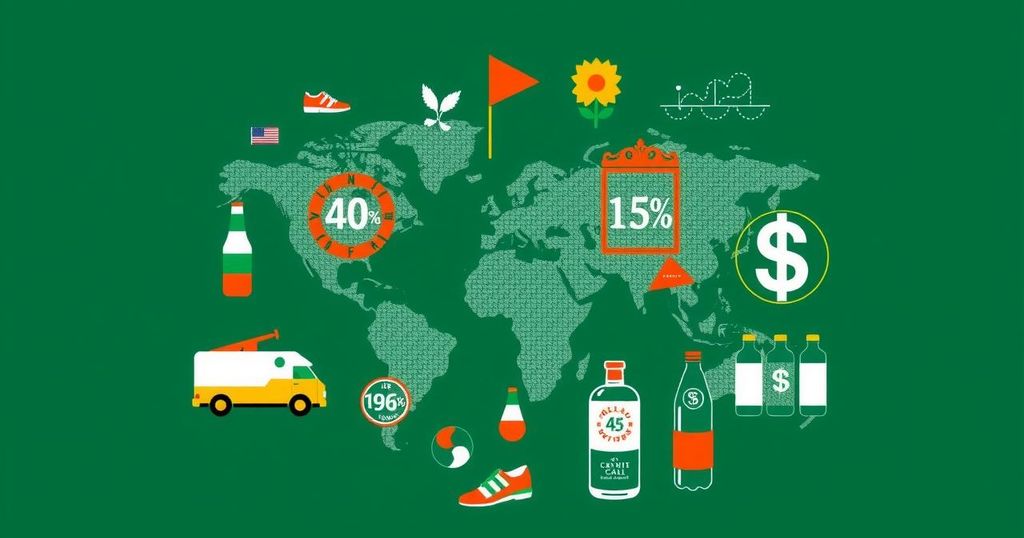Italian Companies Unite in Yhub’s 4S Planet to Combat Climate Change
Fifty Italian fashion companies have joined Yhub’s 4S Planet initiative to combat climate change by assessing their environmental impact and implementing sustainable practices. The program focuses on sourcing, energy conversion, and logistics improvement, emphasizing the importance of sustainability in the fashion supply chain amid increasing global temperature concerns. Francesca Rulli highlights the need for detailed measurements of resource consumption and the transition from traditional production methods to more sustainable alternatives.
Fifty Italian companies engaged in the fashion supply chain have become participants in the 4S Planet initiative, launched by Yhub, a prominent Italian organization dedicated to enhancing corporate sustainability within the fashion industry. This program is designed to meticulously evaluate the environmental impacts of raw materials, energy consumption, and logistics practices. Its comprehensive approach encompasses measures to reduce carbon dioxide emissions, promote local sourcing through reshoring efforts, prefer maritime shipping over air freight, and implement renewable energy solutions such as solar panel installations and process electrification.
In light of the recent conclusion of COP29 in Baku, which highlighted the challenges of global climate negotiations, the urgency for climate action has escalated significantly. With projections indicating that 2024 will mark the first consistent exceedance of pre-industrial temperature levels by 1.5 degrees Celsius, the pressure on the fashion sector—contributing between 2% to 8% of global emissions—intensifies. The production of textile fibers has more than doubled since 2000, reaching 124 million tons in 2023, with polyester dominating this production.
Yhub strives to facilitate brands and their supply chains in the execution of sustainability initiatives through tracking and impact reduction projects. The organization has developed extensive capabilities, supporting over 3,000 companies, collaborating with more than 50 global brands, and mapping a network of over 80,000 suppliers across 22 nations. One of the key resources available through Yhub is Ympact, a platform engineered for managing impact data and widely applying the principles of the 4Sustainability system.
Francesca Rulli, the architect of 4Sustainability and CEO of Yhub, emphasizes that decarbonization is crucial to the proactive strategies of numerous brands and their associated manufacturers. She outlines the necessity of assessing total factory consumption down to specific processes and stages, stating, “The first step is to measure total factory consumption, detailing it by process down to the individual stage or machine.”
She notes that true sustainability transcends mere adoption of technologies like photovoltaic panels; it requires a fundamental reevaluation of production methods. Rulli continues, “Today, brands are demanding very detailed information on environmental aspects, but there are very few that value… materials produced with a lower impact on the climate.” Rulli acknowledges positive developments, such as brands beginning to assess their supply chains’ emissions and forming alliances with environmentally responsible companies.
The fashion industry’s influence on global emissions is significant, with recent studies estimating its contribution between 2% and 8% of total emissions. The escalating production rates of textile fibers, particularly polyester, highlight the urgent need for sustainable practices. The formation of the 4S Planet program is a direct response to both the environmental accountability demand from consumers and regulatory expectations following critical climate summits like COP29. By joining this program, Italian fashion companies aim to proactively participate in the fight against climate change by adopting sustainable practices throughout their supply chains.
The initiative by Yhub to integrate 50 Italian brands into the 4S Planet program represents a strategic movement towards addressing climate change within the fashion industry. By focusing on sustainable sourcing, innovating production processes, transitioning energy sources, and optimizing logistics, these companies are laying the groundwork for meaningful environmental impact reduction. Francesca Rulli’s insights underscore the importance of sustainability as an investment rather than a cost, fostering a culture of accountability and responsibility among fashion brands.
Original Source: www.the-spin-off.com




Post Comment